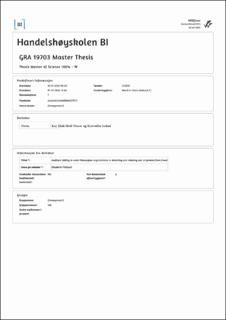| dc.description.abstract | Fraud has become an increasing problem in the last 15 years. Some consequences that can arise from fraud are loss of annual revenue, damage to an organization's reputation, reduction of funds available for public goods and services, and could undermine the public's confidence in the government. External auditors are one of the most used anti-fraud controls globally. However, they rarely find fraud. We find it interesting that external auditors are one of the most used tools to handle fraud when they rarely identify any fraud at all.
In this thesis, we examine how external audit firms assist Norwegian organizations in identifying and reducing the costs originated from fraud. To examine this, we have the following research question: "To what extent do large and small external audit firms assist Norwegian organizations which they audit, to identify and reduce the costs originated from fraud?". ISA 240 is the primary fraud standard used in Norway and is used as a framework throughout the paper. To answer our research question, we collected data through questionnaires and interviews from external auditors, organizations, and other groups that can explain how external auditors help Norwegian organizations with fraud. Furthermore, we used an ordered logistic regression and template analysis, respectively, to analyse the data.
The results show that, on average, external auditors rarely identify fraud in Norwegian organizations. Further, we found evidence that experienced auditors (11+ years of experience) find more fraud than auditors with less experience. Additionally, auditors who spend a certain amount of their total time on ISA 240 find more fraud than those who do not. In addition, auditing high-risk clients increases the chances of identifying fraud. However, the last result is questionable. Further, we found that auditors and associates who audit Norwegian organizations do not have enough knowledge about fraud and ISA 240 and that they do not use enough time on the aspect of fraud to properly identify and prevent fraud from happening. Lastly, we found that Norwegian organizations generally are not particularly satisfied with the auditors' work regarding potential fraud in their organizations. | en_US |
